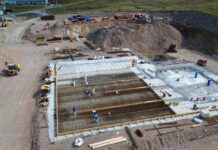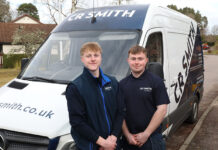
THE University of Strathclyde has won early stage funding to develop plans to tap into geothermal energy contained within disused, flooded coal mines in Scotland.
The university is one of 17 shortlisted groups to deliver the HotScot project, with the consortium behind the project to choose four to eight of the strongest bids to deliver the proposals with £10 million and £50 million in funding to be received by each from the UK Research and Innovation (UKRI) Strength in Places Fund.
If successful, the HotScot project will develop at least three new mine-water geothermal heating/cooling/thermal energy storages sites in the central belt. The university said that the £21 million investment in these sites, in tandem with £16 million research and innovation activities, will demonstrate the commercial potential to private sector investors of low-cost, low-emissions heating, cooling and heat storage for communities and businesses.
The university added that heat trapped in 600 km3 of disused mine-workings in the central belt of Scotland could meet up to 8% of Scotland’s domestic heating demands, with the main barriers to exploring this energy being data on the resources and costs being provided to investors. As a result, the HotScot project will publish all of the data the teams generate from the project publicly.
Graduate apprenticeships and training programmes will also be developed in collaboration with universities and colleges with the project looking to fill the skills shortage in the sector.
Professor Zoe Shipton, of the University of Strathclyde’s department of civil & environmental engineering, commented, “Scotland has an ambitious target to reach net-zero greenhouse gas emissions by 2045, with a 75% reduction by 2030. Flooded coal mines contain water with little to no seasonal variation in temperature making them an ideal heat source for district heating networks to support low-carbon, affordable heating, cooling and heat storage for local communities and businesses.
“The combination of core research, learning-by-doing and the resulting targeted research will not only de-risk the individual projects but address global barriers to mine-water geothermal heating/cooling/thermal energy storage as a technology: creating employment within the Central Belt of Scotland, long-term export opportunities for Scottish skills and products, and sustainable economic growth beyond the project lifespan.”
The project has three main core themes: The project has three core themes: Minimising technical, geological, environmental, societal risks; maximising socio-economic benefits; and engaging communities in their energy future.








